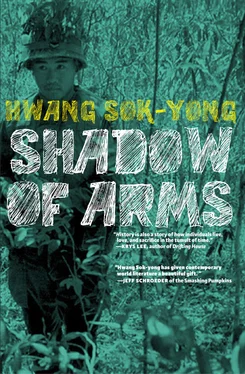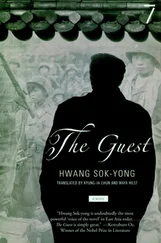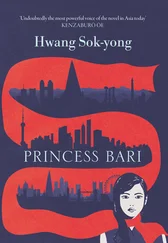As the effect of the whiskey spread over her face, Lin was gradually being transformed back into the old, sly owner of the Sports Club.
“The best time will be right at the very end, after the deadline,” Hae Jong said. “Because we’ll be in no hurry. I mean, as long as we can count on Mike’s help. The lousy commissions are for the moneychanger or the little guys — as for us, we’ll just collect worthless military currency and cash it in for new money.”
“But Major Pham must have large amounts of military currency, don’t you think?” Lin asked. “We have quite a bit, too.”
“We’ve been changing it into greenbacks each month. Of course, we were planning to change them all into checks for remittance later, but. . Anyway, what military currency we have, we can always get Mike to handle that. The big question is, how much time can Mike give us after the deadline has passed?”
By this time Lin was wide-awake and sitting straight up in the bed. “We’ll propose that we collect the military currency and split the profit with him.”
“I’ll go bring him back here.”
When she came into the room, she found Mike sitting there with only his army pants on, drinking a Coke. He seemed to have recovered his composure a little. He must have had a shower, for he was wiping off his forehead with a towel draped around his neck. Hae Jong sat across from him and took out a Marlboro cigarette. Mike lit it with his lighter.
“Thanks, Mimi. They’re all dead, I mean, Frank and the colonel.”
Hae Jong reached out with her hand and ruffled Mike’s brown hair. “Don’t be a baby. You’re a soldier and this is a battlefield.”
“I have no overnight pass and I’m getting worried about getting back. It’s time. .”
Mike was looking at his bare wrist and then started searching around the bed for his watch.
“It’s not even twelve yet,” said Hae Jong. “You said you needed to be back at dawn. Before daybreak, Beck will take you back in his car. By the way, what you said earlier, is that true?”
“What did I say?”
Hae Jong took a deep puff on the cigarette and, exhaling smoke in Mike’s face, said in a cynical tone, “So, it’s supposed to be top secret, huh? You said they’ll change the military currency.”
Mike jumped up. “Did I say that? When? Who heard me? I’m in deep shit now.”
“You said it in this room to Madame Lin and me, nobody else. You don’t need to be so surprised. Mike, you know you almost stayed behind in that room with Frank and Colonel Cao. We were the ones who forced you out. Maybe we should have left you there with them and let you die. That way the secret would’ve been kept, all right.”
Mike raised his arms, as if in surrender. “It’s an order from headquarters in Saigon. From next Monday, the exchange period is one week.”
“Then after noon next Saturday, even the American soldiers won’t be able to use the old military currency at the PXs, right?” Hae Jong thought back to those little commotions in the campside villages. Suddenly, all the American soldiers vanish from the bars, the brothels, and the souvenir shops. A desolate night descends quietly on the campside village, which starts to seem like one of those Gold Rush boomtowns occupied only by ghosts after the mine is shut down. The colorful signs, the gaudy red lights, the whores with their hair dyed yellow and their nails painted red, black, or silver — this rainbow spectrum loses all of its color the moment the link to America is cut off. The specious carnival suddenly reveals its true self. Chocolate drops and candy bars in fancy wrappers, smooth soaps smelling of fragrant dreams, cigarettes adorned with silvery scripts and graceful logos, all sizes and shapes of liquor bottles; these PX goods all lose their magical powers and are degraded into isolated things as soon as the people who consume them have disappeared.
Mornings in the campside villages are always desolate, like the stage in a theater where daylight has intruded. When a rumor circulates that the GIs will change their money, the bar owners, the dry cleaners, the pimps and the whores, even the shoeshine boys all go crazy. All they talk about is dollars, and they vent their indignation at the betrayal by the GIs. When the last day comes, they resolutely burn the most omnipotent little picture-bearing papers on earth. Touched by flames, those oily little sheets turn dark and shrivel before disappearing. The whores do not cry as they peer at the flames. So-and-so lost this much, so-and-so got an advance warning and bought such-and-such goods, so-and-so wallpapered her room with worthless notes, and so on and so forth, all sorts of stories make the circuit through the grapevine until the American soldiers reappear on the scene.
When they come back, all the inhabitants of the campside village soon forget about the money consumed by the flames. They feel relieved that living things have regained their livelihoods with the mediation of the American military. The posts of the US Army are firmly linked to such relief, such anesthesia. Think of a shoeshine boy who instantly can be reconciled to his wretched fate because a Salem cigarette is glowing with a bluish light at the tip of his filthy fingers. This carnival can last only as long as the Americans stay. All the goods and all the ornaments with which the festival is festooned manage incessantly to reproduce, making a solid network among themselves lest anything leak out.
Dollars tossed onto that field of blood, the realm of Caesar, make a blood-red mold from which blossoms emerge — dollars are the money-medium of the world, an instrument of control. The dollar is the leading edge in the imperialist order and the American ID is the organizer. Blood-red flowers are blossoming as part of the aid that spreads military and political power ever more widely over the entire world, aid providing rich nutrition for American capital acting through its network of multinational enterprises, aid to replenish the supply of dollars used as an important medium of international settlements, a medium of savings and of trust, and the solvent that assures prosperity for the international banks.
Hae Jong thought of her first night with Jerry, the American master sergeant back home. The filthy pink curtains, the cheap wallpaper, the 60-watt bulb, the fly shit, the neon light blinking all night through the dirt-smudged window, the odor of Jerry’s chest like that of a rain-soaked dog — she had laid her cheek on that pillow smeared with hair oil facing the wall and tears had streamed down over her face. Jerry stuck his dollars on Hae Jong’s pillow the same way he put paper in his typewriter at the office. The sound of his boots as he trudged away, the long honk of the car, the pop song by Mun Ju-Ran, the aroma of a salty croaker roasted on the fire, the Korean men in pajamas with toothbrushes in their mouths — through the narrow window up by the ceiling, Hae Jong had gazed over the fence of the American army base. The morning sunlight shone through the chain-link fence, casting shadows in ever-repeating shapes. Dollars — greenbacks with an image of ivy vines in a blue rainbow pattern, drawn as though powerfully and insidiously alive — that crisp, lofty paper money used to stare up imposingly at Hae Jong’s naked figure from that filthy satin pillow.
“Why are they changing it?”
“What do you mean why?” the captain echoed her question.
“It’ll only bring great confusion. And that won’t be good for the American army, either.”
“The problem is embezzlement. We’ve been losing five hundred million dollars annually, and that’s only the official figure. Just recently in Saigon we lost an entire container holding several tons of military currency with a face value in the tens of millions of dollars. The truth is, civilian businessmen and US soldiers are dumping the currency and then claiming theft to make arbitrary adjustments in freight receipts and invoices and to evade tax. We have intelligence suggesting that the amount of military currency circulating in the black market is close to a billion dollars. Now the war is reaching a new phase.”
Читать дальше












